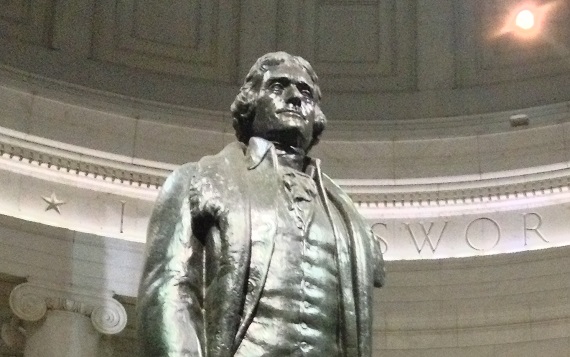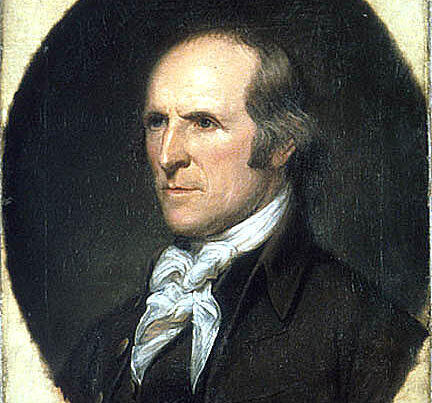The children of Elizabeth “Betty” Hemings—a slave owned by Thomas Jefferson’s father-in-law, John Wayles, a white English sea captain—occupied a special place at Jefferson’s Monticello. That might be because six of Betty’s 10 children—Robert, James, Thenia, Critta, Peter, and Sally—were said to be fathered by John Wayles. Yet we do not know about paternity in either case. Much depends on the veridicality of the testimony of Betty’s grandson Madison Hemings.
We do know that Betty and her children performed the most important functions on and around Monticello. John became a highly accomplished joiner, who did some of the most vital carpentry at Monticello and Poplar Forest. James traveled with Jefferson to France and learned French culinary—a skill he took back to Monticello. Sister Sally travelled with Jefferson’s daughter Maria to attend on her, while she stayed in France, and had light duties at Monticello.
Robert (1762–1819), “Bob” to Jefferson, had pride of place, probably because he was the oldest of the children. Jefferson’s personal servant or right-hand man while just a boy, Bob went virtually everywhere with Jefferson, until Jefferson journeyed to France in 1784, when for all intents and purposes, the close relationship ended.
Having returned from France in 1789, Jefferson wanted back his servant. Sometime before 1791, Bob met and fell in love with a woman named Dolly, who lived in Fredericksburg, Virginia. Bob refused to live apart from her, and Jefferson reluctantly freed him in 1794.
The indispensability of Bob’s services is illustrated by this letter of Jefferson to Daniel L. Hylton (5 Feb. 1792). Jefferson is looking for someone to replace Bob:
Having occasion for a servant boy, who can shave, dress and follow me on horseback, and none such being to be had here, I have thought of a small French boy, Joseph, who came from Europe with Mr. Skipwith, lived sometime with Mr. Randolph my son in law, and is now with a barber in Richmond. I will thank you to engage him to come to me immediately. The wages of such a boy here are 4. or 5. dollars a month generally. I would propose to give him 5, 6, or even 7. but not further, nor indeed so far if you can get him more reasonably. He will be fed and lodged, and have a livery, and it will be expected he should be aiding to do every thing in the house. I will moreover pay his passage in the stage, to which, if you find it necessary, you may add a moderate and fixed stipulation for his subsistence on the road. I wish him to come on immediately, and will ask information from you as soon as you find whether he will come or not.
The passage is suggestive, sexually so, in a number of ways. Jefferson has in mind a small French boy, intimating that Bob had grown too old for Jefferson. Jefferson wants him to come at once—“engage him to come to me immediately” (imperative) and “I wish him to come on immediately” (desiderative)—suggestive (and doubly so, because of the iteration) of unsated, swollen sexual passions. The normal wages are four or five dollars/month, but Jefferson is willing to pay up to seven dollars/month. He is to do “every thing in the house,” suggestive that Jefferson might have some special personal tasks to which the young boy will have to attend. Again, so great is Jefferson’s longing that he is even willing to pay the young boy’s passage to Monticello! Finally, there is that last bit concerning whether the boy “will come or not,” with “come,” here used three times, taking on sexual significance as early as 1650. Hmm. The language is suspicious.
Everything points to strong homosexual needs, which can only be sated by a young boy, color being unimportant.
Outlandish? Incredible? Bizarre?
Recall that Jefferson’s favorite authors were Greeks and Romans and homosexuality was rampant in both cultures. For instance, a man of high social standing in Plato’s Athens was expected to take a boy, roughly between the ages of 12 and 20, under his wings, as it were, both for social guidance and sexual purposes. Plato takes great pains in Phaedrus to show the lengths to which a man would sometimes go—bankruptcy or extreme social derision—to win the love of a young boy. Note that Bob’s special status as Jefferson’s service ended in 1784, with Bob being 22 years of age. If Jefferson so admired the Greeks and Romans, would it have been that astonishing if he should have adopt Greek and Roman social practices? And so, Jefferson very likely had a hankering for adolescent boys. QED! So much for the shock-value of the Sally Hemings story!
The letter to Hylton is sexually evocative, if one is intent on sexually interpreting it. I can also be interpreted non-sexually. Jefferson, from his time with his first servant Jupiter, who like Jefferson was born in 1743, had come to rely on a servant for everyday matters. Why an adolescent? The services of an adult, fitted for more robust activities, would be wasted.
There is a moral behind this outlandish, incredible, and bizarre thesis, which smacks of persiflage, not serious history. It has become not only acceptable, but also praiseworthy, to entertain and publish the most incredible theses concerning Thomas Jefferson’s life. There is Fawn Brodie’s thesis in Thomas Jefferson: An Intimate History, concerning Jefferson’s lust for Sally Hemings and even for his own daughter, Martha, based on a dilettantish grasp of the principles of psychoanalysis. There is Conon Cruise O’Brien’s thesis in The Long Affair that Jefferson from 1787 to 1793 so came to worship liberty that it was to him worth just about any loss of life. There is Henry Weincek’s thesis in Master of the Mountain that Jefferson personally loved slavery, in spite of what he wrote, because it proved pecuniarily profitable. There is Andrew Burstein’s thesis in Jefferson’s Secrets that Jefferson’s presumed affair with Hemings was due to medical advice from a book by Tissot to seek a sexual outlet with a no-strings-attached young women for sustained health. There is Pauline Maier’s absurd claim, in her book on the Declaration, American Scripture, that Jefferson is “the most overrated person in American history,” as if she has done a study of every character in American history. There is Gordon-Reed’s imaginative account in The Hemingses of Monticello of what likely happened between Jefferson and Sally Hemings, while the two were in France, while she admits the two wrote nothing about it and said nothing about it to others. There is Maurizio Valsanio’s The Limits of Optimism, which offers us a psychological assessment of Jefferson after having pledged not to do so, and which is filled with poorly supported universal claims. I could go on, and on, and on.
Why is Jeffersonian scholarship so casual, sloppy, hyperbolic, indifferent to evidence, and wedded to cherry-picking? Why are wild rhetoric rewarded and cautious ratiocination ignored?
The answer, I suspect, goes at least as far back to Merrill Peterson and his brilliant watershed book, The Jefferson Image in the American Mind. Peterson says, “The Jefferson image, may be defined as the composite representation of the historic personage and of the ideas and ideals, policies and sentiments, habitually identified with him.” Peterson is not so much concerned with the truth or falsity of that image—the historical Jefferson—but with a depiction of that image and some assessment of what it tells us about our “evolving culture.”
Because Jefferson seemed to be a “baffling series of contradictions”—“philosopher and politician, aristocrat and democrat, cosmopolitan and American”—later generations of historians “comprehended his thought only in fragments, crossing and colliding with each other, until it seemed that the protean figure, if ever he had genuine historical existence, must never be rediscovered.” Notice that for Peterson the nodus is not inscrutability, but a mind, “bewildering in its range and complexity.” That decuples the difficulties of a historian’s task, when fronted with Jefferson. It does not make Jefferson impenetrable.
That thesis, usually a corrupt variant of it, has been iterated and reiterated in numerous books and essays after Peterson—e.g., Joseph Ellis’ American Sphinx and Peter Onuf’s The Mind of Thomas Jefferson. Onuf, in what I take to be a serious misread of Peterson, goes so far to say that Jefferson is so inaccessible that in approaching him, “we are doomed to cluelessness in our own world, like Plato’s cave, a domain of shadows and hand-me-down light.” A historian, thus, can do no other than construct a “possible Jefferson”—viz., a Jefferson that is human like the rest of us and not a synecdoche for America.
Onufian historiography is liberalism at its extreme—Progressively liberal or liberalism for its own sake. That is open-mindedness as an end and not as a means for an end—truth. If we follow Onuf’s advice, then just about anything goes, when it comes to Jefferson, and my account of Jefferson’s homosexual attraction to “Bob” Hemings is as good a bit of Jeffersonian scholarship as is anything else that does not sanctify Jefferson. It is a possible Jefferson.
As historians, we need to recognize that the stance of open acceptance of all historical accounts of Jefferson, others, or events in history is not only doomed to fail, but cancerous. The incautious scholar then gets treated the same as the serious scholar. Historians need to engage with and critically assess the works of others to separate the few nuggets, hidden in the dungheap. Only then can we hope for a clearer account of significant and sometimes not-so-significant historical figures and the times in which they lived.
The question we ought to be asking does not concern the sloppiness of much of Jeffersonian scholarship, but this: Why are sloppy scholars often the most handsomely rewarded? If fantasy is so much more preferable to verity, what will that say about the sort of narratives that future generations read? We are already seeing the results of that with Progressives’ denigrative accounts of Southern figures, Jefferson among them, and Southern events. That is why Abbeville was birthed in the first place.






but with a depiction of that image and some assessment of what it tells us about our “evolving culture.”…..BINGO or devolving culture.
“we are doomed to cluelessness in our own world, like Plato’s cave, a domain of shadows and hand-me-down light.” A historian, thus, can do no other than construct a “possible Jefferson” i guess use words that put a great founding father like a cartoon character and he probably doesn’t seem real.
Well, it would seem that whatever we “learn” about Jefferson, it certainly isn’t going to be “good” in the sense that patriotic Americans would consider that word. However, I can assure you this, had Jefferson been involved sexually with non-whites or boys, IT WOULD HAVE BECOME KNOWN AND BEEN MADE KNOWN LONG BEFORE NOW! The fact that every conclusion is the result of speculation speaks volumes about what has (and has not) been said. Certainly, unless Jefferson murdered his “lovers” ~ male or female, white or black ~ SOMEBODY would have “peached!” Famous people are always subjects of scandal especially after they are no longer able to defend themselves. Oh, and there’s always good money for scandalous tales! People really don’t even need to believe them, they just need a lack of clear evidence to the contrary.
I wrote a book on Col. John Singleton Mosby based upon newspaper coverage on the man from 1862 through the year of Mosby’s death in 1916 and I can tell you that stories stating that he had been a monster of murderous cruelty continued in far more than newspapers! Indeed, such slander still remains even until today. In Mosby’s case there were eyewitness accounts from the very men he was supposed to have abused that testified exactly the opposite but nobody cared. The fiction was more welcome than the facts and I can understand that much the same applies to Jefferson! As for a romance with Classical Greece, Mosby himself was a great scholar of the Classics and often said that he “. . .was born a Greek.” Yet that “love” never intruded upon his sex life! It is unwise in the extreme to take a cultural “norm” and transplant it into the lives of people who have studied and embraced that culture years later!
I wonder what they will try to do with George Washington. After all, our current post-modernist ethos demands the destruction of anything positive in our nation’s history and what could BE more positive that the man called “the Father of his country.” I’m sure that some “scholar” will find sufficiently wretched stories to tell about the man whom King George himself declared to be one of the greatest in history for walking away from almost total power. Let’s face it, many of today’s “scholars” find little need to be truthful and accurate when something else is demanded by our “historians.”
My fifth great grand uncle, Thomas Jefferson, whose eldest sister, Mary Jefferson Bolling, was my fifth great grandmother, through my paternal grandmother, Bertha Jane Bolling Wills… is hourly being defiled by a Liberal (Federalist Hamiltonian) America. I would think more to be said of that wretch, Hamilton, when history could stoop to notice him, of being a gay blade… and possibly with General Washington, who seems to have been absolutely nuts over that little fop, Alexander Hamilton… Thomas Jefferson, as a loner, was not in any position to have such affairs, lest every “child of the place” know and speak of it daily. And the Annette Gordon-Reeds of this wretched era would have long ago drilled into this theory with an absolute will…
Excellent, Valerie!!
But statues of GW have been toppled by the “out with the old” ( echo of Mai’s Cultural Revolution!).
Wonder what “ they” will rename Washington & Lee in Lexington?
But they haven’t yet gotten open in their rejection of Washington who was really a MUCH greater man than most know. For instance on a program about the battle of Yorktown in which Washington and his French allies captured Cornwallis’ whole army, it was noted that Washington wished to attack New York and in so doing make up for his loss in that city. In the end, however, he chose what was best for the war effort rather than for his own pride. God knows what would have happened had he not done what was best rather than what he personally wished to do. Not many around like that anymore.
Thank you Professor Holochak,
Your scholarship of Jefferson serves as a microcosm for the historical record of all our founding fathers. Ditto Valerie Protopapas’ scholarship of Mosby.
Oh should every history department at every university in America be subject to your high standards of truth!
Thomas Schaaf
Google this….Lancet, editor, Horton, medical research, fraudulent…then sit back and enjoy the show.
Do you wonder if historical research is for sale if medical research is bought and paid for?
Peer review is only valid if the peer group has a moral code…McPherson is a well-know northern author…try to find a discussion he presents on the Corwin Amendment. I can’t find one. I don’t think it exists in his world…though the yankee congress and 5 yankee States seemed to think it was important…
Why even start or propagate this ugly rumor? Let me express my ignorance and apathy – I don’t know and I don’t care!
Not meant as a rumor, Don, but a lampoon or revisionist history.
Am I missing something? Where did Mr. Holowchak come up with this hell-acious proposition? There is absolutely no basis for this article. It is worse than the one of Mr. Jefferson and Sally Hemings! I shan’t be reading anymore of Mr. Holowcak’s demeaning and devious scribblings.
Yes, you are missing something. The author is explaining how lies become treated as truth when the lies are put down on paper…as if the very act of typing a word makes it the truth.
Rick, is this so confusing? Do you not see a lampoon of revisionist history????? Read carefully.
Thank you, Mr. Platt, for your response, but I still fail to see how this article good ever be of any literary value. There are an over abundant amount of examples already in the prevaricating historiography to exemplify the lies upon lies prevalent in the so-called story of Mr. Jefferson, et al. This was unnecessary.
Thank you for kind words.